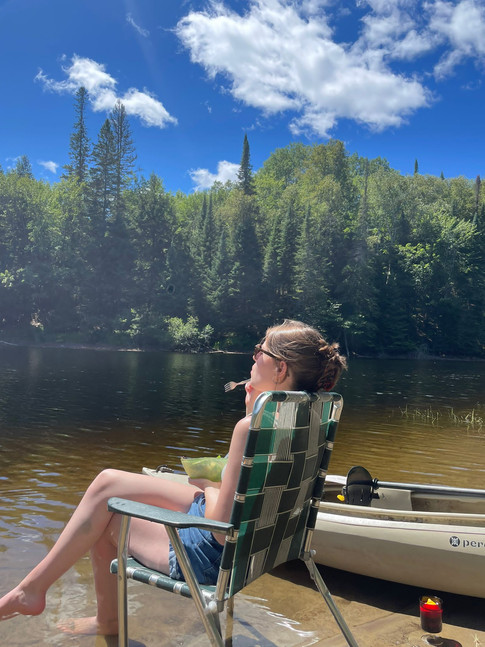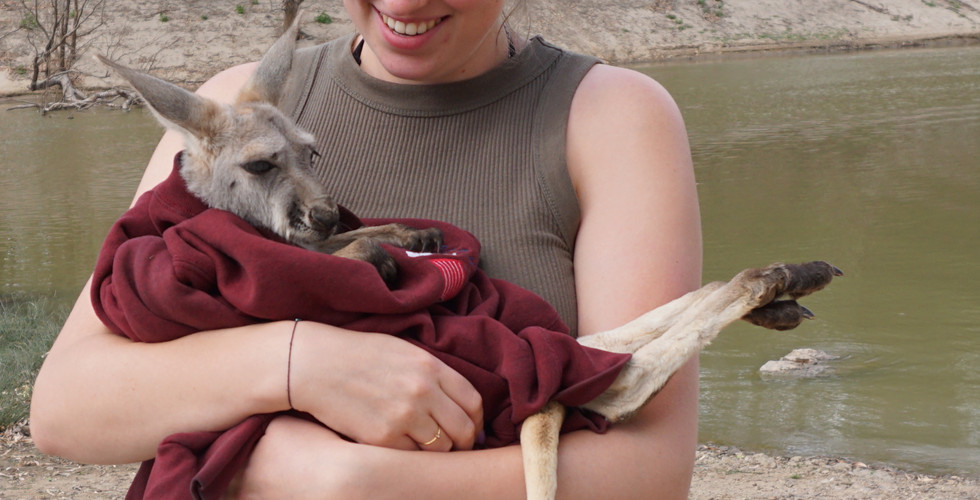Part two: Taking care of your mental well-being
- Miriam van den Berg & Tamar Oderwald

- Oct 4, 2023
- 8 min read
Updated: Nov 7, 2023
By Miriam van den Berg & Tamar Oderwald
This article is also available to read in our ebook "Ethnographic Fieldwork: An anthropology student's toolkit". Click here to download.
I (Tamar) remember learning about the different stages of fieldwork. There’s the honeymoon phase when everything is new and exciting. You’ve entered a new environment and you’re eager to get started on your research. Then reality sinks in. You establish a rhythm and feel completely immersed in your research. Eventually, there’s the breakdown. You start to wonder: “What have I gotten myself into?” Perhaps you’re facing some serious setbacks and you have to readjust your expectations of what your fieldwork will or should look like. Finally, the adjustment phase, when you pick yourself back up and get reacquainted with that enthusiasm of the first few weeks.
In our experience, however, this is far from a linear process. There is no steady transition between the phases, nor is there an end to the cycle. You may find yourself in the honeymoon phase one day, and experience a breakdown the next, or vice versa. Managing these ups and downs can be quite challenging. We hope these tips and reminders can help with that process.
Dealing with homesickness/loneliness
Homesickness comes and goes for me (Tamar). I have quite a hard time changing environments and stepping out of my comfort zone. Admittedly, this alone has made me wonder why I chose anthropology in the first place, as there is no such thing as “comfortable” ethnographic research. That’s a sidetrack for another time, though. What helped me was to find a healthy balance between staying in touch with friends and family back home, as well as reserving time to truly experience being away. At the risk of sounding a bit cheesy, I would make a conscious effort to note it whenever I felt happy, proud, or content during the research. That made me value my choice of going abroad much more, and it would reinforce my self-confidence. Had I stayed home, I would not have gotten to grow as a researcher and as a person in the way that I was able to in Canada. And that’s a comforting thought that helped keep my homesickness at bay.
I (Miriam) didn't struggle that much with homesickness or loneliness during my fieldwork. I was very busy learning new things and having new experiences, I kept in regular contact with friends and family and spent hours calling people. But a lot of people do struggle with loneliness during fieldwork. You're in a new environment, you don't really know anyone and you're going to be pushing yourself out of your comfort zone a lot. Something that really helped me feel less alone and made me feel calmer was having my own space. For me, this was just my bedroom in a shared apartment, but I took some printed pictures from home and hung them on my wall similar to how I had decorated my room back home. Knowing I had this safe space that was all mine helped me feel a lot more grounded in this strange new environment.
Communicate!
Communicate with your fieldwork partner. You are in this together and you are reliant on each other to ensure a successful, enjoyable, and rewarding fieldwork experience. Perhaps you can have a daily or otherwise regular check-in with them, to see how you both are doing on a personal, and mental level, as well as how the progression in the research is going. Talking through your feelings and your data can help you to navigate your emotions and offer you interesting perspectives on where to go next for your data collection process.
If you don’t have a fieldwork partner, reach out to a friend! Talking to other people, especially if they somewhat know what your research is about or what fieldwork can look like, will provide you with new perspectives and a place to voice your concerns. Or if you’re lucky like me (Miriam), you can talk to the same person about your research for a couple of hours each week so that they basically become like a fieldwork partner (thanks Tamar).
Be clear with your supervisor and communicate your needs to them. It's completely okay if you would like to have some more meetings in between the scheduled checkups. Your supervisor is there to assist you and make sure you can get something useful out of your fieldwork experience. Maybe don't call about every little thing all day, but having regular meetings can help clear up your doubts if you have them. They have been on fieldwork before, they're trained anthropologists and they (kind of) know what they're doing, so make use of that!
On top of that, it can be really helpful to keep a (video) diary during the course of your fieldwork. We will delve into that a bit further during a later segment, but for now we’ll say that these methods of reflection have helped us a lot in the processes of gathering our thoughts and keeping an overview of our fieldwork activities. It’s a great place to release some anger and frustration, too, when things aren’t going according to plan. It’s just for you to read or rewatch, so there is no social pressure of saying the right thing or formulating perfectly correct sentences.
In addition, talk to people about something other than your research! I (Miriam) made sure to also meet with people that weren't part of my research population. This can bring its own challenges (we’ve dedicated an entire chapter on this in the booklet that comes out on 1 November!), but it allowed me to switch off sometimes and just enjoy the company of other people without constantly thinking about my research. You're human. You need connections. It's okay to have them during fieldwork too! Yes, your main goal and the main reason why you’re there is your fieldwork research. But, don’t forget to have a bit of fun! You can make new friends, explore the place you’re suddenly living in for the foreseeable future, and create memories outside of your research area.
Here’s something to keep in mind though: Always be honest about why you're there! Because your new non-research connections might tell you things that are interesting for your research, but they might not give you consent to use it. Don’t assume that just because you’re friends with that person, they’ll be okay with you using the information they give you. We’ll delve deeper into this in the aforementioned chapter of the booklet, but as a general reminder: it’s better to ask too often, than not enough. Remind people why you’re there, tell them bits about your research to ensure that they remember, and ask for their consent if you use any of their information.
Take breaks
As a rule of thumb, fieldwork takes up about the equivalent of a full-time job (30-40 hours per week). Don’t be fooled though: that includes the dull administrative work required for ethnographic research (more on that in a later segment), so you won’t be spending those full 30-40 hours in the field. It leaves you with quite a bit of time to focus on non-research-related activities. We find that these moments are especially helpful for keeping ourselves sane. So make time for activities that fulfill you outside of your research. Paint your nails, keep your body moving, grow some tomatoes (highly recommend!), watch some Netflix, and explore the area. In short: allow your mind to be taken off your fieldwork on a regular basis.
In that vein, we also recommend planning a short vacation or getaway somewhere in the middle of your research. It doesn’t have to be extravagant or expensive. I (Tamar), for example, was able to borrow a car to spend some time in a lakeside cabin with a friend, in full relaxation-mode. Physically stepping out of my research allowed me to come back to it with a clear head and some new perspectives. You’re subconsciously processing information and reflecting on your findings, even while you are away, which you can then incorporate in the remaining weeks of your fieldwork.
I (Miriam) got invited to a weekend away during Easter, with the family of one of my main research participants. They invited me along to the outback where they had lived prior to moving closer to Melbourne. I knew that this would probably give me some context and information that was useful for my research, but I mainly wanted to go to spend more time with some of the people that I had gotten to know through my research and to seize the opportunity to see the outback. I explicitly chose not to bring my laptop and brought my notebook and audio recorder just in case. Going into this weekend mainly focused on just enjoying this slightly out-of-the-box experience, with people that I barely knew in a place I had never even heard of before, meant that I really stepped away from the everyday routine that I had become accustomed to in Melbourne.
This trip gave me new insights into my research topics that I would have never been able to discover otherwise. But mainly, I got to meet really interesting people that I otherwise would probably never have met, and have crazy new experiences such as shooting a gun (at a can) or holding a baby kangaroo!
General reminders
You are doing enough. Even when you think you are not. (read that again, and again, and again). It is so easy to see other people and feel like they're doing more because somehow they've already done five interviews in the first couple of weeks while you feel stuck. But that does not mean that the work that you're doing isn't important. It took me (Miriam) two whole months to have my first interview. But I went out to the 'field' almost every day, and I did gather data in other ways. Just because something takes long, doesn't mean that you're doing a bad job.
It is just a research project. Yes, it is important. But don't forget that you're a student! You're doing this to learn! It's okay that you're not an expert, because you don't have to be. It is just a research project that you're giving your best shot at. If things don't work out, you're allowed to change it. Don't make it bigger than it is, and give yourself the reminder that you don't have to change the world with the research you're doing right now.
You know your field and what is possible for you - do not compare your research to the research of others, especially when they are researching a different topic/in a different location/with another time frame. If you're doing research in a small town where everybody knows each other, it might be easy to use the snowball method and get to know other people. When you're in a big city, you might have a lot of different opportunities to meet people and experience different perspectives. But both also have their challenges. So, if other students seem to be progressing really fast, don't feel discouraged. Every situation is different and requires different tactics. You are there, you know best what can and cannot be expected. Don't compare your research projects when you're doing something completely different!
What about you?
What do you wish you had known about ethnographic fieldwork before embarking on that journey? Leave us a comment below and share your experiences with fellow students! We always appreciate your insights and stories.
Next up
In our next segment (to be published on 11 October), we’ll discuss the importance of your personal safety and how to maintain your boundaries. Stay tuned!













Comments